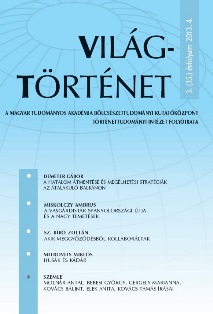A hatalom átmentése és megélhetési stratégiák az átalakuló Balkánon
Preserving Power and Strategies of Survival in the Transforming Balkans
Author(s): Gábor DemeterSubject(s): History
Published by: Magyar Tudományos Akadémia Bölcsészettudományi Kutatóközpont Történettudományi Intézet
Summary/Abstract: This contribution focuses on the discussion of new results in the Bulgarian historiography. The reevaluation of some key problems of the Bulgarian economic and social history in a comparative context reveals a hesitative attitude towards sensitive questions. The new approaches applied were able to question the results of the Marxist history-writing, but yet unable to put processes in a new and undisputed context. The Western interpretation of the Ottoman Empire as a successful integration having brought economic progress and its obvious parallelism with the EU-accession generated a confusion in the history writing, as the fi rst „integration attempt” was always denied on the basis of the lack of freedom regardless of the economic progress, while the latter is approved on the basis of promising economic welfare. The fear that the re-evaluation of the Ottoman role may ruin the myth of the moral superiority and economic benefit of the Bulgarian independence (the legitimative basis of the nation itself) is well perceivable even in the works of the well-educated and trained scientists with international respect. After sketching a general outline of the tendencies, topics and methods, observable in the Bulgarian history-writing, some general problems are discussedin the text, like the role of the elites, the grab of power and its transmission to subsequent generations, the restructuration of the Ottoman economy after the collapse of the raiyet chift, base of taxation system in the 18ths century. Social strategies of the peasantry, like convertion to Islam, migration, implementation of new crops, land-concentration and the changes land-tenure-system in order to hinder further declassation are analysed, as well as welfare, income and the participation of the peasantry in trade. Regional diff erences of crop-system prior to the crop-conjuncture of the 19th century are also investigated. The transformation of the askeri group taking place in the 18th century was another shocking phenomenon that required the restructuration of the Empire. The article – using 3900 testaments of the garrison-town Vidin between 1700-1800, home of Pazvandoglu – analyses the economy, revenues and the emergence (as well as the differentiation and their relative independence from central power) of the janissaries compared to the decline of spahi corpus and central power. Another part of the study compares the income and taxes of the broad layers of the society throughout centuries (1700-1939), investigating the economic advantages of the independence. The state revenues were declining after the independence, and the fiscal discipline of the 1860s could be only restored in the 1930s...
Journal: Világtörténet
- Issue Year: 2013
- Issue No: 4
- Page Range: 393-428
- Page Count: 36
- Language: Hungarian

